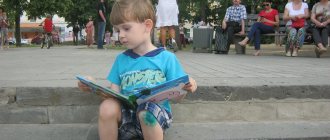Presentation for parents “The importance of daily routine in the life of a preschooler” presentation for a lesson on the topic
Slide 1
Medvedeva K.M. St. Petersburg 2013 Presentation on the topic: “The importance of daily routine in the life of a preschooler”
Slide 2
A necessary condition for the health, physical and psychological well-being of a child is adherence to a daily routine. The correct rhythm set by the routine of life in kindergarten should not be disturbed on weekends, when children spend the day and night in the company of their parents. “The importance of routine in the life of a preschooler”
Slide 3
The daily routine is an alternation of different types of activities: rest, sleep, nutrition, being in the fresh air. And if in a preschool institution the regime is strictly adhered to, then on Saturday and Sunday the rules of an orderly life are often violated. As a result, on Monday morning, most children look tired or, conversely, overly excited. "Daily regime"
Slide 4
Not only the child, but also the parents suffer from violation of the regime. Together with your baby, you spend too much energy, get tired faster and don’t have time to do anything. The conclusion is simple: adherence to the regime makes life easier for both you and your child.
Slide 5
By accustoming children to a certain regime, to fulfill hygienic requirements, we create in them skills that are useful for the body and thereby preserve their health. A firm daily routine, established in accordance with the age characteristics of children, is one of the essential conditions for the normal physical development of a child.
Slide 6
The main requirement for the regime is accuracy in time and correct alternation, replacing one type of activity with another. There must be a set time when the child goes to bed, gets up, eats, walks, and performs simple, feasible duties. This time must be strictly observed.
Slide 7
Only during sleep does the child receive complete rest. Sleep should be long enough: children 3-4 years old sleep 14 hours a day, 5-6 years old - 13 hours, 7-8 years old - 12 hours. Of this time, it is necessary, especially for younger children, to allocate an hour and a half for daytime sleep. Children should go to bed no later than 8-9 pm.
Slide 8
Nutrition . Children receive food 4-5 times a day. The first meal is given half an hour later, in any case no later than an hour after the child wakes up, and the last one is given an hour and a half before bedtime. Between meals, intervals of 3-4 hours should be established, they must be strictly observed. The most nutritious food is given at lunch, less nutritious - for dinner.
Slide 9
Walks. No matter how accurately the time of sleep and food is observed, the regime cannot be considered correct if it does not include time for a walk. The more time children spend outdoors, the healthier they are. Based on the experience of kindergartens, it has been established that preschool children are accustomed to daily walks.
Slide 10
The reason for canceling a walk for a healthy child may be exceptional circumstances: heavy rain, severe frost with strong winds.
Slide 11
The daily routine of a preschooler is not an artificial invention of doctors and teachers. It is based on accurate observations of the physiology of a preschooler and changes in his activity throughout the day and week. It is known that maximum performance is manifested in a child from 8.00 to 12.00 and from 16.00 to 18.00, and minimum - at 14.00–16.00. Therefore, activities that require mental stress are best planned in the first half of the day. "From hill to hill"
Slide 12
By the end of the week, the child’s performance decreases and fatigue increases. This is especially true for those children who attend preschool. There is nothing surprising in this - after all, in a children's group, the baby has to “curb” his desires and emotions, control his motor activity. All this requires a huge expenditure of nervous energy. It's no secret that children can get tired of intense communication with their peers. Therefore, treat with understanding and respect the fact that your child needs relaxation at home on Saturday and Sunday.
Slide 13
Ideally, the following daily regimen is recommended for a preschooler: maximum duration of continuous wakefulness - 5.5–6 hours; sleep - 12.5–12 hours (of which 2–2.5 hours are naps during the day); four meals with an interval of 3.5–4 hours. It is very important that the regime at home coincides with the regime of the preschool institution. Find out what your child's daily routine is like in kindergarten. You may be surprised - he himself will tell you what you are doing wrong at home and help you adjust your routine. "Learn from the child"
Influence of factors on health status
The following main factors influence a healthy lifestyle:
- environment and ecology – 20%;
- heredity and genetics – 20%;
- healthcare system and access to treatment – 10%;
- lifestyle – 50%.
These are the main points that determine a healthy lifestyle. Maintaining a healthy lifestyle and observing all its rules and regulations helps strengthen the immune system, the full development of all systems of the human body, including the mental one, as well as prolonging youth and activity for many years.
Interesting and simple recommendations on how to improve the quality of life in your book “Myths about Health. “Where do diseases come from” is given by the famous Russian journalist and TV presenter Igor Prokopenko and Doctor of Medical Sciences, Professor Sergei Bubnovsky.
This topic has attracted the close attention of scientists especially in the last two decades, with the development of scientific and technological progress and information technology. Facts about a healthy lifestyle indicate that it was two or three decades ago that people began to be replaced by machines. Let's take, for example, the same automatic washing machine. If previously you had to make an effort and wash your clothes by hand, now while the laundry is in progress, you have the opportunity to lie on the sofa with a glossy magazine or spend an extra hour on social networks. This also applies to the manufacturing sector. Previously, people worked in the fields, on farms, in factories, but now more than half of the workforce has been replaced by automated machines that do all the work instead of a person, thereby freeing him from physical labor.
Along with a decrease in physical activity, economic factors have a negative impact on well-being. In a market economy, every entrepreneur tries to reduce production costs and saves on everything. First of all, this affects the quality of products consumed by people. Hence the bad environment, mass diseases and many other problems that determine a healthy lifestyle.
Poor health, stress, depression, decreased immunity are largely the result of a person’s lifestyle.
What does the daily routine depend on?
There are external and internal factors that contribute to the development of a certain daily routine for a person. The main internal factor contributing to the development of certain human behavior is biorhythms. Biorhythms are fundamental processes of living nature, the natural activity of the body and its systems, carried out with a certain periodicity. An example is the change of day and night, seasons, etc. All physiological processes occurring in the body are coordinated with the general passage of time. The main factor regulating the biorhythms of all living things is the Sun. The importance of biorhythms for humans was proven by physiologist I.P. Pavlov, who argued that there is nothing more significant for a living organism than the rhythm and periodicity of physiological changes occurring in the body. Biological rhythms largely determine a person’s daily routine. It is biorhythms that determine a person’s performance, ability to assimilate information, and learn. An external factor that determines a person’s daily routine is his participation in the life of society: studying and attending educational institutions (kindergartens, schools, higher education institutions), work at an enterprise, which contributes to the development of a more or less constant daily routine. Mandatory components of the daily routine: Labor is the main condition for existence in society, the expedient, conscious activity of an individual aimed at meeting the needs of himself and society; Rest is a necessary component of the daily routine, a way of spending time, the purpose of which is to restore physical strength and stabilize the psycho-emotional state in order to achieve a normal level of performance; Personal hygiene – a period of time for carrying out procedures to preserve and improve health; Meals – a sufficient interval of time during the period of work and rest for a full meal; Time for self-development and improvement is a period for other types of activity (reading, visiting the theater, communicating with people).







